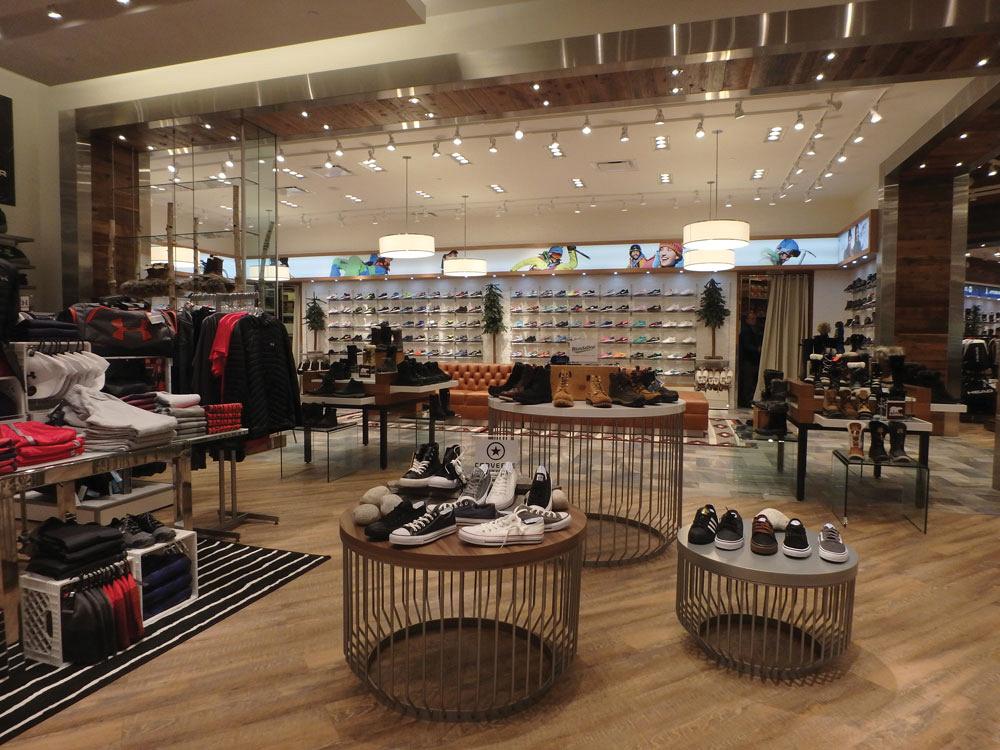Editor
- FMA
- The Fabricator
- FABTECH
- Canadian Metalworking
Adapting to market demands at BGI Metal
Paris, Ont.-based company expands capabilities to stay the course in 2020 and beyond
- By Rob Colman
- March 19, 2021
- Article
- Fabricating

BGI Retail created BGI Metal when it realized that it was outsourcing millions of dollars of metal fab work. The cost and time requirements of outsourcing made launching its own fab shop a sound investment.
Adaptability is the key to longevity for most companies. Sometimes adapting means using new processes to achieve the same ends - automating processes and creating leaner operations. Sometimes it means finding a completely new market to serve with the skill sets that would otherwise go underused in your business. Paris, Ont.-based BGI Metal went through the process of adapting in the latter fashion over the past year.
Integrated Expansion
BGI Metal was created as an offshoot of BGI Retail, which has been in the business of building retail store fixtures since 1989.
“When most people think of store fixtures, they think of racking and standard shelves you see in many big-box stores,” said Bill Johnson, vice-president operations for the two companies. “But that is a commodity business in which it’s difficult to be competitive. Some products we produce integrate into standard racking, but the majority of our designs are custom rolling racks, floor fixtures, wall systems, and displays. We started as a graphics company that created in-store signage for wayfinding. From there we morphed into a millwork and plastic décor provider. Then, in 2017, we started building our own metal fixtures because we were outsourcing several million dollars of product per year.”
BGI is not unlike a fab shop that produces complex assemblies to order; the difference is that the combination of metal, wood, plastics, and digital print makes production of its assemblies that much more complicated. The BGI team includes not only engineers, fabricators, and millworkers, but also environmental designers who can create retail spaces for customers using 3D design software.
The work can also be just as compressed timewise as any other assembly.
“I came from the automotive industry, where we worked on product development for one to two years, took that product through approvals and into production for maybe four years, and gradually improved on it,” said Johnson. “This industry is comparatively lightning-fast. We can be awarded a million-dollar project and have to turn it around in 10 weeks, from design through nationwide installation in-store, without interfering with major holidays, blackout days like Black Friday, and other constraints.”
Metal Moves
BGI’s approach to growth is to respond to necessities. When the monetary and time cost of outsourcing metal fab work became too much in 2017, the company hired Jamie MacDonald to serve as plant manager of a new metal division and bought a series of used machines to suit the company’s primary needs - a shear, a laser cutting table, a press brake, and welding equipment. The shop started with three employees (including MacDonald) and currently has 12 employees on the floor. In February plans were in place to bring on more team members.
“We brought in expertise to manage the fab shop, and those people brought with them relationships with potential customers for strictly fab work,” said Johnson. “The retail business is a mix of project-based work and ongoing contracts, so we can get real swings in production schedules. Having other B2B projects to fill time in the shop became important.”

Plant Manager Jamie MacDonald has worked with Amada machines his whole career, which is why the press brake department is solely Amada machines. The newest investment is a 12-ft., 250-ton brake machine that MacDonald chose for its capacity and the simplicity of its offline programming software.
Gradually BGI Metal took on a life of its own, tackling anything from outdoor furniture to cold-formed steel components.
“We’re supplying a lot of steel and aluminum components to a local outdoor playground and furniture manufacturer, as well as galvanized components for digital services tower constructions,” said Johnson. “The impact of COVID-19 on these industries was positive because municipalities were still spending their budgets for outdoor recreation, and the work-from-home surge identified the need for improved rural services.”
Pandemic Product Adjustments
Early in the pandemic, the situation was slightly different for BGI.
“We came up with a number of products to assist restaurants, retail, and offices in meeting the new safety expectations from the government,” said Johnson. “Initially retailers were asking for sanitizer stands, acrylic barriers, floor decals, and curbside pickup signs, so we developed a catalogue of items (of which you can see a large number on our website). The products integrated all of the materials we use – digital print, acrylics, metal, wood structures. We even developed a walk-through temperature sensor using a thermal camera to check your temperature.”
BGI was able to pivot and flex its manufacturing capacity to support new opportunities during lockdown, focusing all departments on projects for essential businesses.
Equipment Attraction
While BGI’s overall head count has, by necessity, dropped slightly over the past year, investments in the fab shop are drawing more customers.
“We have invested in new equipment to meet our needs, but in the process have drawn more business,” said Johnson.
For instance, in 2020 the shop purchased a new 250-ton Amada press brake and a Cincinnati shear capable of cutting 12-ft. lengths. The capacity of these two machines has landed the shop work preparing components for cold formed structural members, window framing components, and cladding for industrial buildings.

This is an example of BGI Metal's custom retail fixture work. It is an all-aluminum structure, using 1/4-in. aluminum brackets laser-cut and formed in the company's shop.
“I’ve worked on Amada machines my whole career,” said MacDonald. “They are just workhorses and you never have to worry about too much downtime with them. The deciding factor on getting that particular model of press brake, however, was its 12-ft. length and the offline programming software it has, which is very easy to use.” BGI has an offline programmer who handles all the programming for the press brakes, as well as the laser and turret punch press.
Another key investment for the company was two new Fronius welding machines to support a customer making aluminum outdoor furnishings.
“Although the digital, liquid-cooled machines were quite expensive, the ROI laid out by our plant manager demonstrated that it was a no-brainer of an investment for our dedicated aluminum cells,” said Johnson.
“The machines we purchased I consider the best for aluminum welding,” said MacDonald. “The computer-controlled system is liquid-cooled and ideally suits the process. Unlike standard MIG guns, where you’re pumping a great deal of heat into the metal, which has the potential to create a lot of porosity in aluminum welds, the digitally controlled feed-in/feed-out rates on the gun create a clean, consistent weld.”
Johnson hopes to continue to invest in newer technology to meet customer needs.
“For instance, a tube laser makes abundant sense for our primary retail customer base because it allows us to bend and weld parts without unsightly corners,” he said. “That nice, non-protruding edge that doesn’t need further processing is ideal.”
BGI is also in the process of rolling out a new enterprise resource planning system provided by Burlington, Ont.-based Seradex.
“Planning and logistics are a critical part of ensuring we can deliver projects on time,” said Johnson. “The toughest part of that is managing the manpower involved. Seradex has the capabilities to help run our business from customer relationship management through to finance. We’re really excited to launch in May!”
Know-how Key
While machinery is great, Johnson notes that it’s the BGI team members and integrated capabilities that will make a difference even on strictly metal fab-based products in the future.
“The key is that we have design capabilities and passionate people at the heart of our business,” he said. “People come to us with a basic idea and we help them make that idea a reality. It’s that personal touch and our ability to execute that makes us stand out.”
MacDonald agrees, saying he feels like the process of integrating the fab shop into BGI Retail’s design process has strengthened the fab shop’s ability to provide the same service to outside clients.
“When I first arrived at BGI, working on designs with the team for the most cost-efficient integration of metal products was a learning curve for me,” MacDonald said. “In the process of building that relationship, we’ve become an integral part of both BGI Retail’s design process and the design processes of a number of our most critical customers. These customers are now designing their products to get the most value from our expanding capabilities. This is the sort of partnership we hope to expand going forward.”
Editor Robert Colman can be reached at rcolman@canadianfabweld.com.
BGI Metal, www.bgimetal.com
About the Author

Rob Colman
1154 Warden Avenue
Toronto, M1R 0A1 Canada
905-235-0471
Robert Colman has worked as a writer and editor for more than 25 years, covering the needs of a variety of trades. He has been dedicated to the metalworking industry for the past 13 years, serving as editor for Metalworking Production & Purchasing (MP&P) and, since January 2016, the editor of Canadian Fabricating & Welding. He graduated with a B.A. degree from McGill University and a Master’s degree from UBC.
subscribe now


Keep up to date with the latest news, events, and technology for all things metal from our pair of monthly magazines written specifically for Canadian manufacturers!
Start Your Free Subscription- Industry Events
MME Saskatoon
- May 28, 2024
- Saskatoon, SK Canada
CME's Health & Safety Symposium for Manufacturers
- May 29, 2024
- Mississauga, ON Canada
DiPaolo Machine Tools Open House 2024
- June 4 - 5, 2024
- Mississauga, ON Canada
FABTECH Canada
- June 11 - 13, 2024
- Toronto, ON Canada
Zoller Open House & Technology Days 2024
- June 12 - 13, 2024
- Ann Arbor, MI






















